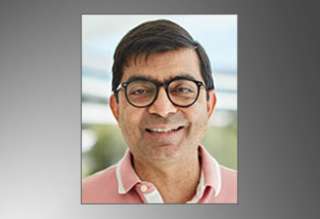Director, Human Language Technology Center of Excellence
Top Reasons to Join SPS Today!
1. IEEE Signal Processing Magazine
2. Signal Processing Digital Library*
3. Inside Signal Processing Newsletter
4. SPS Resource Center
5. Career advancement & recognition
6. Discounts on conferences and publications
7. Professional networking
8. Communities for students, young professionals, and women
9. Volunteer opportunities
10. Coming soon! PDH/CEU credits
Click here to learn more.
Director, Human Language Technology Center of Excellence
Johns Hopkins University is seeking an established, highly respected scientist to serve as Director of the Human Language Technology Center of Excellence (HLTCOE). With a dual report to the University’s Provost and Dr. Edward Scheinerman, the Director will be charged with growing the Center and its record of accomplishment.
Human Language Technology Center of Excellence
The Johns Hopkins University Human Language Technology Center of Excellence (HLTCOE) is a world-class research center creating advanced techniques for analyzing a wide variety of speech, text, and document image data in multiple languages. Established in 2007, the HLTCOE is home to an ever-expanding group of outstanding research scientists and graduate students who utilize state-of-the-art technology to address unique and exciting challenge problems. Other key members in jointly establishing this HLTCOE included the Johns Hopkins Center for Language and Speech Processing, the University of Maryland College Park, and BBN Technologies.
The Center's research focuses on extracting useful information from massive amounts of text and speech and developing algorithms for advancing the state-of-the-art in HLT in speech and text. Current problems focus on improvements in speech to text (STT), machine translation (MT), information retrieval, entity extraction, spoken language applications, and related topics. Research at HLTCOE is broadly motivated by the following two challenge problems:
- How can we turn unstructured language data into structured knowledge?
Many important applications will become possible when systems can automatically produce language-independent structured representations of knowledge derived from unstructured text, speech and document image data in a wide variety of languages and genres. The derived knowledge can be aggregated into a cumulative knowledge base, but it can also serve as input to a range of downstream analytic and inference technologies. Although humans could potentially extract the kinds of information needed (such as various classes of entities, relations, events, opinions, scenarios and so forth), the large volumes of heterogeneous data, the complexity, and the required level of detail make manual approaches to such tasks impractical. Reasonably accurate, fully automatic methods are therefore essential; additionally, these automatic methods require some mechanism for computing and representing uncertainty, confidence and likelihood of error from both the input data and the algorithms as an integral part of the resulting analytics.
- How can modern human language technology be adapted to low resource settings?
Many human language technologies are already useful and steadily improving, but they share a common weakness: compared to humans, their accuracy degrades sharply when the input differs from the type of data on which the technology was developed or trained. This brittleness is common to both speech and text processing technologies. HLT systems need to be more robust to changes in language, dialect, genre and domain, as well as to changes in the data over time (i.e., shifts in topics/domains/entities-of-interest/etc.). They also need to be affordable at scale. Most state of the art HLT systems, including speech to text, speaker and language identification, machine translation, and information extraction, employ modeling and pattern recognition techniques which require substantial, or even massive, amounts of speech or text data, along with translations, transcriptions, annotations, analyses, parses, or other metadata to train and evaluate the models. These linguistic resources, especially in languages with little commercial use, are expensive – in fact, some are difficult to acquire at any price. Given these practical realities, this challenge calls for research that enables useful HLT applications in low-resource settings. These applications must (a) perform robustly in the face of changing data conditions and across many languages and (b) include (automated) maintenance strategies for continued robust performance as the characteristics of the input data change over time.
The Center employs over two dozen researchers and is one of several groups at Johns Hopkins University that jointly work on speech and language research. Relevant departments include Computer Science, Electrical and Computer Engineering, and Applied Mathematics, as well as the Center for Language and Speech Processing (CLSP). Many HLTCOE researchers have primary and secondary appointments in these other academic departments and centers in the Whiting School of Engineering. Additionally, graduate students from these departments are advised by center researchers.
The Johns Hopkins Institutions
At the time of their founding, the Johns Hopkins University and Hospital set the pace for American higher education and medicine. More than a century later, they remain world leaders. Together, the Johns Hopkins Institutions, which comprise the University and the Johns Hopkins Health System, are the largest private employer in Maryland, employing 46,000 people, 40,000 of whom work in Baltimore City. The Johns Hopkins Institutions generate more than $10 billion annually in regional economic impact.
The Johns Hopkins University
The Johns Hopkins University was incorporated in 1867 under the terms of a $7 million bequest from Johns Hopkins, a Quaker merchant of Baltimore, who directed that the funds be used for the establishment of a university and a hospital. The Johns Hopkins University was founded for the express purpose of expanding knowledge and putting that knowledge to work for the good of humanity. Today, Johns Hopkins is world renowned for undergraduate and graduate study, research, professional practice, and patient care. It attracts the finest undergraduate, graduate, and professional students and more federal research funding than any other university in the United States.
Johns Hopkins opened its doors in 1876 under the leadership of its visionary first president, Daniel Coit Gilman. President Gilman and his first board of trustees conceived of and brought together, for the first time in history, the key elements of the American research university: a creative faculty given the freedom and support to pursue research; fellowships to attract the brightest students; education emphasizing original work in laboratory and theory; and scholarly publication.
Currently, Johns Hopkins has approximately 6,500 faculty, 6,200 undergraduate students, and 17,600 graduate students. The University offers approximately 230 degree programs at the baccalaureate, master’s, and doctoral levels.
Johns Hopkins comprises 10 divisions: the Whiting School of Engineering, the Zanvyl Krieger School of Arts and Sciences, the Carey Business School, the Schools of Education, Medicine, and Nursing, the Bloomberg School of Public Health, the Peabody Institute, the Paul H. Nitze School of Advanced International Studies, and the Applied Physics Laboratory (APL), as well as multiple centers, institutes, and affiliates.
The University’s revenue budget for 2016 was $5.3 billion. The University’s endowment was $3.3 billion at the end of fiscal year 2015.
The Whiting School of Engineering
Many HLTCOE researchers have primary and secondary appointments in academic departments and centers in the Whiting School of Engineering. The School comprises over 200 full time tenure-track, research, and teaching-track faculty in nine academic programs with a total annual research budget of over $100 million. Research partnerships with the Johns Hopkins School of Medicine, APL, Bloomberg School of Public Health and the Krieger School of Arts and Sciences make the Whiting School of Engineering a unique research and educational environment. Student enrollment exceeds 1,800 at the undergraduate level and includes over 1,000 full time MS and PhD students. The Engineering for Professionals program enrolls over 2,000 part-time continuing education students and is the largest program of its kind in the country.
Opportunities for the new Director
Recent advances in human language technology have created unprecedented opportunities to apply HLT algorithms to traditional and novel problem areas. Both speech recognition and machine learning techniques take advantage of the latest deep neural network (DNN) advances; the concept of traditional languages and dialects (exceeding 8,000) is upended by the challenges of ever-changing informal languages (tweets, acronyms, etc.). The Johns Hopkins University HLTCOE is at the forefront of efforts to translate discoveries in basic language research into practical applications. The HLTCOE seeks a Director who will lead the development of novel research efforts and oversee ongoing activities in speech and text research.
The Director will report to both the University’s Provost and Dr. Edward Scheinerman, and work closely with a government sponsor Contracting Officer’s Representative and senior sponsor leadership. The Director will represent HLTCOE at an executive level both within Johns Hopkins and to sponsors. S/he will work closely with the external research community, build partnerships with research organizations and companies, and seek to extend the HLTCOE organization through research grants and contracts.
Success for the new Director will be measured by enhanced quality and stature for the Center, as evidenced in:
- Achieving a balance of voice, text, and multimedia research best suited to address current and future challenge problems;
- Assuring continuation of current sponsor funding;
- Soliciting and obtaining additional funding from new sponsors for HLT and related research; and
- Creating a long term, sustainable budget model.
Qualifications
The new Director will be an exceptional leader who is a recognized scholar in one or more scientific areas related to human language technology research. S/he will have a dossier that includes a strong track record of scholarship and evidence of a passionate commitment to research, discovery, and application. Candidates must be US citizens.
Education and Qualifications:
- An earned doctorate in an HLT-related field;
- Recognized leader in his/her respective field with a distinguished national and international reputation for research;
- Excellent communication skills in both internal and external interactions;
- A strong commitment to diversity at all levels among faculty, students, and staff and fostering a welcoming, inclusive environment, and
- Five or more years of leadership experience within a complex research environment.
The best candidates will also have many of the following capabilities and personal attributes:
- Strong budgetary and operational skills;
- A collegial, problem-solving style based on personal integrity and ethics, professional confidence, and excellent relationship management skills;
- Nuanced judgment and personal maturity; and
- A participatory leadership style that models the values of service, initiative, and collaboration.
Please send nominations, applications, and inquiries to:
Jennifer McDonough
Odgers Berndtson
Jennifer.McDonough@odgersberndtson.com
Johns Hopkins University is an equal opportunity employer and does not discriminate on the basis of gender, marital status, pregnancy, race, color, ethnicity, national origin, age, disability, religion, sexual orientation, gender identity or expression, veteran status, other legally protected characteristics or any other occupationally irrelevant criteria. The University promotes Affirmative Action for minorities, women, individuals who are disabled, and veterans. Johns Hopkins University is a drug free, smoke free workplace.
SPS on Twitter
- DEADLINE EXTENDED: The 2023 IEEE International Workshop on Machine Learning for Signal Processing is now accepting… https://t.co/NLH2u19a3y
- ONE MONTH OUT! We are celebrating the inaugural SPS Day on 2 June, honoring the date the Society was established in… https://t.co/V6Z3wKGK1O
- The new SPS Scholarship Program welcomes applications from students interested in pursuing signal processing educat… https://t.co/0aYPMDSWDj
- CALL FOR PAPERS: The IEEE Journal of Selected Topics in Signal Processing is now seeking submissions for a Special… https://t.co/NPCGrSjQbh
- Test your knowledge of signal processing history with our April trivia! Our 75th anniversary celebration continues:… https://t.co/4xal7voFER





